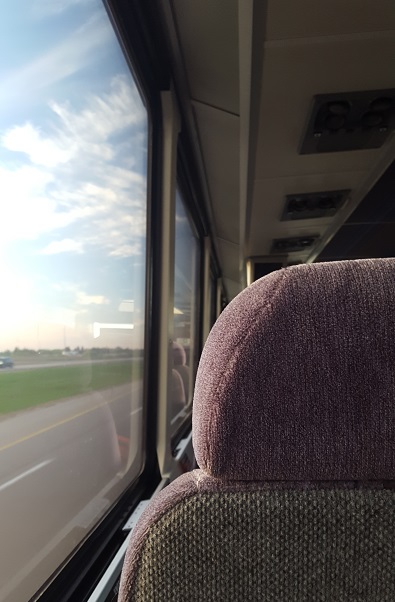The view from inside one of STC’s last trips. Photo by Chelsea Laskowski.
Earlier this month, a federal consultation meeting on a new Disabilities Act heard that the closure of the provincial bus company is a major concern for people with disabilities in northern Saskatchewan.
Hearings were held in Prince Albert on July 12 with Pinehouse’s Gary Tinker speaking as the vice-chair of the Tinker Foundation, an advocacy group for the disabled.
Tinker has cerebral palsy and says without STC, people like himself have limited options when they have to go to larger cities for treatment or appointments.
“Now we don’t have any more transport, right,” he said. “What are we supposed to do, stick our thumb out? We have to catch a ride with somebody.”
The new disabilities act was promised in last year’s federal budget. It is focused mainly on employment and accessibility.
The minister in charge is holding cross-Canada hearings, and is expected to have the proposed legislation before the House of Commons next year.
A total of 18 public consultation sessions will be held.
Meanwhile, Georgina Jolibois is one of two Saskatchewan-based federal NDP politicians who want the Liberals to step in on STC’s closure.
She and Sheri Benson, both MPs, have penned a letter to three women cabinet members on the topic.
The letter says seven different women’s groups are concerned about STC’s closure, and that “STC’s role as a safe, reliable mode of public transportation from isolated communities in the north to services and spaces in urban centres has not been replaced and leaves many people vulnerable and stranded.”
It goes on to point out how the single Saskatchewan stop for the national inquiry on missing and murdered Indigenous women and girls’s hearings is in Saskatoon, and questions how people with limited budgets will be able to make it there without a public bus service.
The province has already approved at least one company to take over some of its old STC routes but in an interview with MBC, Jolibois said that doesn’t mean the federal government can’t get involved.
“It should be able to come up with a plan that is feasible to accommodate reserves as well as municipalities. When I think about the federal government’s responsibility, they do support cities and infrastructure, and municipalities and infrastructure, and so they should be able to work with the province,” Jolibois said.
“There should be a responsibility of some kind, jointly or on their own to create something to accommodate northerners and rural members.”
